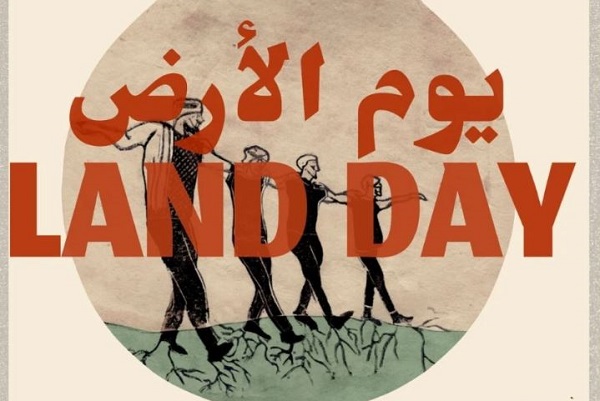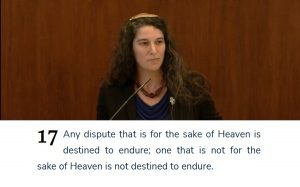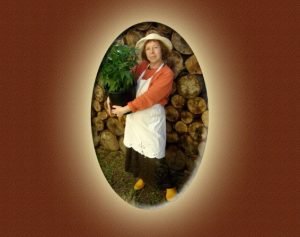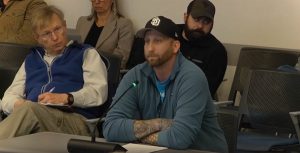Land Day rally includes poetry, call for peace
11 min read
Presenter: Eugene marks Palestinian Land Day with a rally and panel discussion at Kesey Square. From the Party for Socialism and Liberation, Kamryn Stringfield:
Kamryn Stringfield (PSL Eugene): We are living in an era of profound upheaval. So much is unraveling before our eyes and beyond our sight. What began with the abduction of Mahmoud Khalil has now expanded to graduate students and labor organizers being seized by plainclothes agents. Meanwhile, Gaza, Lebanon, Syria, and Yemen are all under bombardment by what is effectively the same force, the imperialist U.S.-Israeli regime.
[00:00:42] The work we do today may seem small in comparison. But it is essential, and it is what Palestine calls on us to do: to keep speaking out, to use our privilege and voices for Palestinian lives, dignity, and liberation.
[00:01:01] As we gather to mark Palestine Land Day, we remember the violent seizures of land and the killings carried out in 1976. Today, we see the same patterns—a century-long struggle for justice marked by both suffering and steadfast resistance. We stand in solidarity with Indigenous peoples fighting for their lands and rights on this continent.
[00:01:28] Presenter: Panelists were asked: What significance does Land Day have for you and your family personally?
[00:01:34] Panelist #1: A large part of retaining and at this point healing and holding on to Indigenous identity is holding on to the land, the stories it has and everything it bears. And what we’re seeing in the context of genocide and since Oct. 7 is the direct degradation of that land too.
[00:01:56] Having a relationship to it in an almost sacred way is important for a time like now where they’re branding it with army symbols and just scorching it to no avail.
[00:02:09] Being on the land at this point has become defiant.
[00:02:13] The massacre that occurred to have Land Day be celebrated is just one of many. It’s unfortunate that there’s so many things to have to be remembered and talked about, but this is just the aggression that our people have gone through for over 100 years.
[00:02:27] Panelist #2: When I think of Land Day, I think back to my grandfather, my سيدو, who lived with his brothers and sisters on the land when Zionist gangs and settlers came to forcibly remove them from their home. They couldn’t take anything with them. They couldn’t argue. They couldn’t resist. They were removed and displaced.
[00:02:51] And when I think of Land Day, I think of all the people who don’t have the choice to stay on their land, the people who are removed from this earth from their land. It is important to reflect on those who are still there and also those who can no longer reside on their land, whose spirits remain there.
[00:03:12] This time has come to recognize all the martyrs and the casualties that we have lost upon this day who will not get to return to their land, who will not get to see their homes once again, and I think back to my سيدو and how much he would have liked to see his land, his home, once more, otherwise that a settler family moved into that home.
[00:03:44] It is not easy to speak about this and it is not easy to stand here talking about all that my family has lost, all that many families have lost, all that we have lost as a society and as a community.
[00:03:58] But if you feel that in your heart, if you feel that loss, if you take that upon yourself to feel it, that is reflection within itself. That is honor. That is honoring the people we have lost and honoring the lives that will no longer be able to return. And fighting for what we can, which is the land that remains and the land that we must protect.
[00:04:21] Panelist #3: Hi, I am a second-generation Palestinian American on my father’s side. I brought with me my grandparents who lived on the land. We’re some of the (I guess) relatively lucky (with lucky being a relative term) families that still have the land that my great-grandfather bought sometime between the 1850s and 1870s.
[00:04:44] It had a home on it when he bought it and they built another home that was used for guests, sometimes traveling missionaries, and used as a school as well.
[00:04:55] They have an olive mill that my family built. My great-grandfather bought the engine and my father kept it running and an olive orchard as well.
[00:05:04] And it has gone from a thriving home and community with 20 to 30 people living on the land at one time, multigenerations, to today, there’s one auntie holding steadfast on the land who lives there alone, refuses to leave. If she does leave, it’s quite obvious that the land will be taken.
[00:05:28] My half-brother and his wife left only about seven years ago. They were trying to stick it out as the young people to hang on. And it just got too much, you know, all of the things that you see on the news happened to them. They’re typical in that way, with having soldiers enter the home in the middle of the night to terrorize them, illegal settlers terrorizing the entire neighborhood, checkpoints.
[00:05:55] My niece who was about 12 when they left Palestine, her job was to get her younger sisters to and from school alive every day and I think a lot of days was routine but there were days that there were soldiers. There were times she saw dead people as a young child and that was her responsibility.
[00:06:16] I called my uncle last night. All of my father’s siblings are still alive, ranging from 81 years old to 99 years old. And so I spoke with my uncle who lives in California last night just to make sure I had a couple of details right of different things.
[00:06:32] And one of the saddest parts to me is that he’s 96 years old. His family owns two houses and what he calls enough land for a village. And he bounces around between his kids, essentially not having a home of his own, even though he has an ancestral home and a sister that he’d love very much to see.
[00:06:54] So the other piece of this for me is the right of return and the Palestinian presence on the land. And even though my family, my brother and his family were some of the last holdouts to leave, they still maintain their Palestinian citizenship.
[00:07:08] And my niece turned 17 last year. You’re supposed to get it when you’re 16, but as a young immigrant family with three kids they haven’t been able to make the trip to Palestine. But they’re still hopeful they can go and do everything they need to for their documentation and maintain their status so they can go home when they want to and stay as long as they want to. My sister-in-law’s entire family is still there in the West Bank.
[00:07:31] But yeah, that’s what Palestinian Land Day means to my family at this moment in time. Thank you.
[00:07:46] Panelist #4: Hi, my grandparents are also from Jerusalem, and Land Day, to me, what I think of is the connection that people have with the land, especially in Indigenous communities, and this is true for Palestinian communities as well, and how our connection with the land is the first thing that Zionist militias will target. They will outlaw indigenous practices of foraging for za’atar.
[00:08:18] They will cut off ancestral access to olive groves and different farming and agricultural areas to deny the millennia of presence that the people have had and the connection that have grown with the land.
[00:08:35] And to strip the people of their land is to also strip the land of the people that know how to care for it, know how to steward it, and know how to protect it. And what we see in Palestine is the disregard of human life and the disregard of the land.
[00:08:54] They plant trees that are nonnative. They cut down native species. They push out families that have been on olive groves for generations. And all of this culminates in the mass erasure of Indigenous peoples by the erasure of their connection with the land.
[00:09:17] And so what Land Day means is remembering that and honoring that and all of the martyrs that we’ve lost to the Israeli occupation to protect the land, and all of the people that have died on that land are still there and are evidence of our resistance and our continued presence there.
[00:09:35] Panelist #5: Hello everyone, I am a Lebanese Palestinian American, and I want to tell you guys a story of how my grandmother got expelled from her homeland in Palestine.
[00:09:47] One of the very first times that I started protesting was in downtown Portland when I was younger. And I remember when I was protesting, I used to think about, like: ‘What am I doing here?’ I was seven years old, I had no idea. And I asked my grandmother one day, and I was like, ‘Hi,’ like, ‘What are we protesting for?’ And she sat me down and she told me the story of why, why we’re protesting.
[00:10:13] She began by telling me how it was a sunny day and she remembers hearing a lot of noise outside her home. And she noticed a bunch of men gathering other men and putting them in her front yard. And some of these men were digging up holes in her front yard. And the men that I’m talking about, these are soldiers. They’re British soldiers and modern-day IDF soldiers.
[00:10:43] And she’s describing me how she’s seen these men digging up really deep holes in front of her front yard and gathering men from her neighborhood and lining up the men in front of these holes. And one of those men in front of those holes was my great-grandfather.
[00:11:02] One by one, each man stood behind the hole. They were forcefully forced out of their homes, and my grandmother told me that she saw her father in the middle of one of those holes that she’s in front of.
[00:11:20] So the soldiers, they came up one by one, the gunmen, would shoot each one of those men from her neighborhood, falling to their own pre-dug graves. And my grandmother witnessed this. And as each one of these men fell into their own graves, my great-grandfather was next in line.
[00:11:41] There’s a saying in Arabic called “wasta.” Wasta means connections. And a lot of survivors in Palestine and in Gaza, normally they have wasta. Wasta means that if you know somebody, they can help you get out. They can help you survive. And in this moment, my great-grandfather had wasta.
[00:12:03] He befriended some of the British soldiers and they helped him not get killed that day. After that, the soldiers came into my grandmother’s home, destroyed everything they had, and they forcibly removed her from her home. She told me how she had a grave journey all the way to Lebanon, Lebanon to Syria, Syria to Qatar, and Qatar to America.
[00:12:28] When I tell you guys this story, this isn’t a unique story at all. And that’s the issue. Millions of Palestinians, millions of Palestinian Americans have this exact same story of their parents or their grandparents getting killed. This was the Nakba, and I want you guys to remember that it’s still happening till this day. Thank you so much.
[00:12:57] Panelist #6: My dad, he and his siblings, they grew up here, but my dad decided to go to Palestine and marry from there. And I grew up in Palestine most of my life. I grew up and the schools there, every year we have this day, Land Day.
[00:13:19] And we are growing up with the same ideas of, like, ‘This is our land, and we should not leave this area.’ And I’m grateful for that because when I visit my grandpa’s house on his land, I feel like he did a lot for this land to keep this heritage.
[00:13:40] And every day I grow up and they are taking more land and more land and more land, I felt like I’m living in a small hole. I can’t breathe, because I can’t go north, I can’t go south, I can’t go anywhere. Everything is occupied by them and they make it more small to a Palestinian to move anywhere there. There is one mountain in front of my house, and they take it.
[00:14:07] And when I go to Hebron, all the land is taken. I’m questioning 2.5 of the land they left for us. Where is the rest? Thank you.
[00:14:29] Presenter: The event also included a poetry reading by Shachar Efrati:
[00:14:33] Shachar Efrati: On This Land, by Mahmoud Darwish.
We have on this land that which makes life worth living
We have on this land all of that which makes life worth living
April’s hesitation
The aroma of bread at dawn
A woman’s beseeching of men
The writings of Aeschylus
Love’s beginning
Moss on a stone
Mothers standing on a flute’s thread
And the invaders’ fear of memories
We have on this land that which makes life worth living
September’s end
A woman leaving ‘forty’ behind
with all of her apricots
The hour of sunlight in prison
A cloud reflecting a swarm of creatures.
A people’s applause for those who face their own erasure with a smile
And the tyrant’s fear of songs.
We have on this land all of that which makes life worth living…
[00:15:58] Thanks, that’s Mahmoud Darwish.
[00:16:08] Presenter: Commemorating Palestinian Land Day in Kesey Square, one panelist recalled an earlier time of peace:
[00:16:14] Panelist: I want to point out, and I bet you everybody else here has similar stories, there were peace among Jews, Christians, and Muslims before there was Zionism in Palestine. Don’t let anybody tell you that Palestinians are just violent and that’s why people can’t get along.
[00:16:30] And I’m not proud of violent resistance that my people felt obligated to do after trying peaceful solutions. I’m not proud of it. I’m not condoning it on on either side, but I want you to know that the overwhelming response from my family is to just want peace.
[00:16:46] There is no hatred for Jews in our family. My grandmother was a midwife. She helped bring babies into this world from all faiths. Their neighbors were Jewish. My family was Christian. Their neighbors on the other side were Muslim. They would breastfeed each other’s babies in a pinch. They were community like we are community, and there’s no reason that they can’t be again.
[00:17:10] There’s deep connections there between all of us, despite our religions, and that’s all we want again is those connections and peace.
[00:17:28] Presenter: Eugene commemorates Palestinian Land Day March 29 at Kesey Square. The event was recorded by Todd Boyle for KEPW 97.3 and is available in its entirety on his YouTube channel.






